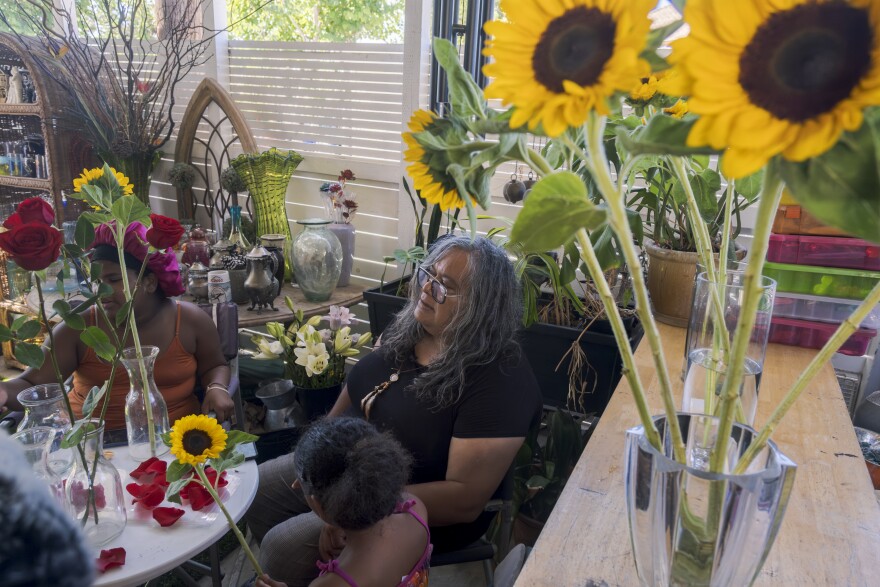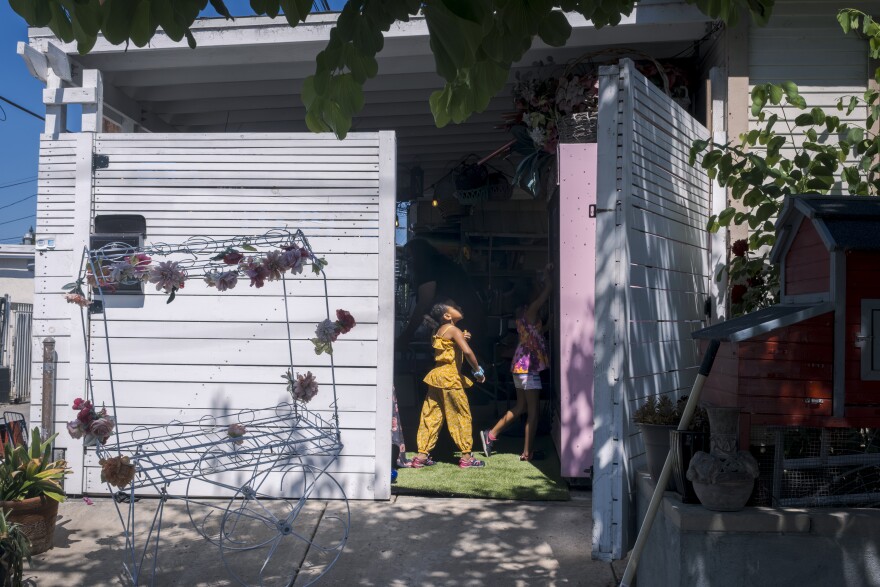On a street in Logan Heights, plants peek out from an open carport. There are fewer than there used to be before Jan. 22, when stormwater knocked over supplies, ruined the computer and left the flower shop in shambles.
But life is creeping back.
The garden dirt has been swept from the floors. Roses sit inside the humming refrigerator again. Windchimes dangle between vases of sunflowers — florist Jackie Jo Lopez’s favorite.
“I’m a small business. So everything I lost is by hard work and sweat,” she said.
The storms struck just weeks before what was usually her biggest sales day of the year — Valentine’s Day. She gave what flowers she could salvage to the other evacuees at a shelter in Lincoln High’s gymnasium. Then, she joined the county’s hotel voucher program.
She said her mother had an accident at the hotel, and they decided to live in the back of her florist van instead.
“We stayed in the car because of the trauma,” she said. “She fell inside the hotel, and we couldn’t take it no more.”
Lopez began tumbling through bureaucratic cracks.

Moving out of the hotel in March disqualified her from the housing commission’s recovery program, which only extends to those still using hotel vouchers on May 23.
Receiving a few thousand dollars from her renter’s insurance provider disqualified Lopez from FEMA assistance, which will not reimburse people for things insurance has already covered.
Because she had forgotten to renew her business license, it was expired when the flood hit, and she was rejected for a business recovery grant.
Meanwhile, she found it hard to keep filling orders.
“I had no idea that this was actually going to knock me off to my knees to the point that I was not able to get up sometimes from bed because it was extremely depressing,” she said.
She began to have panic attacks and anxiety. She shut down the flower shop’s website.
“I didn't want to deal with no one,” she said.
She said before the flood, she brought in about $15,000 to $20,000 in revenue every month.
Now, she said she’s lucky if she pulls in $1,000.
Falling income collided with a rise in rent after her landlord repaired and remodeled her home, she said.
She could no longer afford it. She began renting out her bedroom.
She didn’t want to speak about where she currently sleeps, just said she’s “doing OK.”
And, with the same hard work and sweat that created all she lost, she’s slowly trying to build her business again.

“I'm feeling much better now, and I'm doing funeral arrangements every once in a while. Happy birthdays. And people are stopping by little through little,” she said.
She plans to relaunch the website soon.
“I think we should flourish again, even if the world is in turmoil as it is. But we've got to be resilient and think positive, you know?” she said.
She said she’s not discouraged. She sees this as “rebuilding herself.”
“I know I've been hit and I fell many times, but we got to get back on that bike and keep pushing,” she said.
She said she’s met many flood survivors in worse situations than herself — people who lost their homes completely; people who did not have insurance; people who were stuck in the hotels without cars or transportation.
Many survivors might never be captured in the numbers reported by FEMA or other government recovery programs.
Lopez said her 96-year-old neighbor was displaced, but never sought government help.
“His house got all watered, flooded completely, and he was not staying there for two or three months because of it. He didn't get any help. He didn't go to shelters. I had no idea,” she said.
With or without help, known or unknown to government agencies, Lopez said flood survivors have no choice but to keep going.








